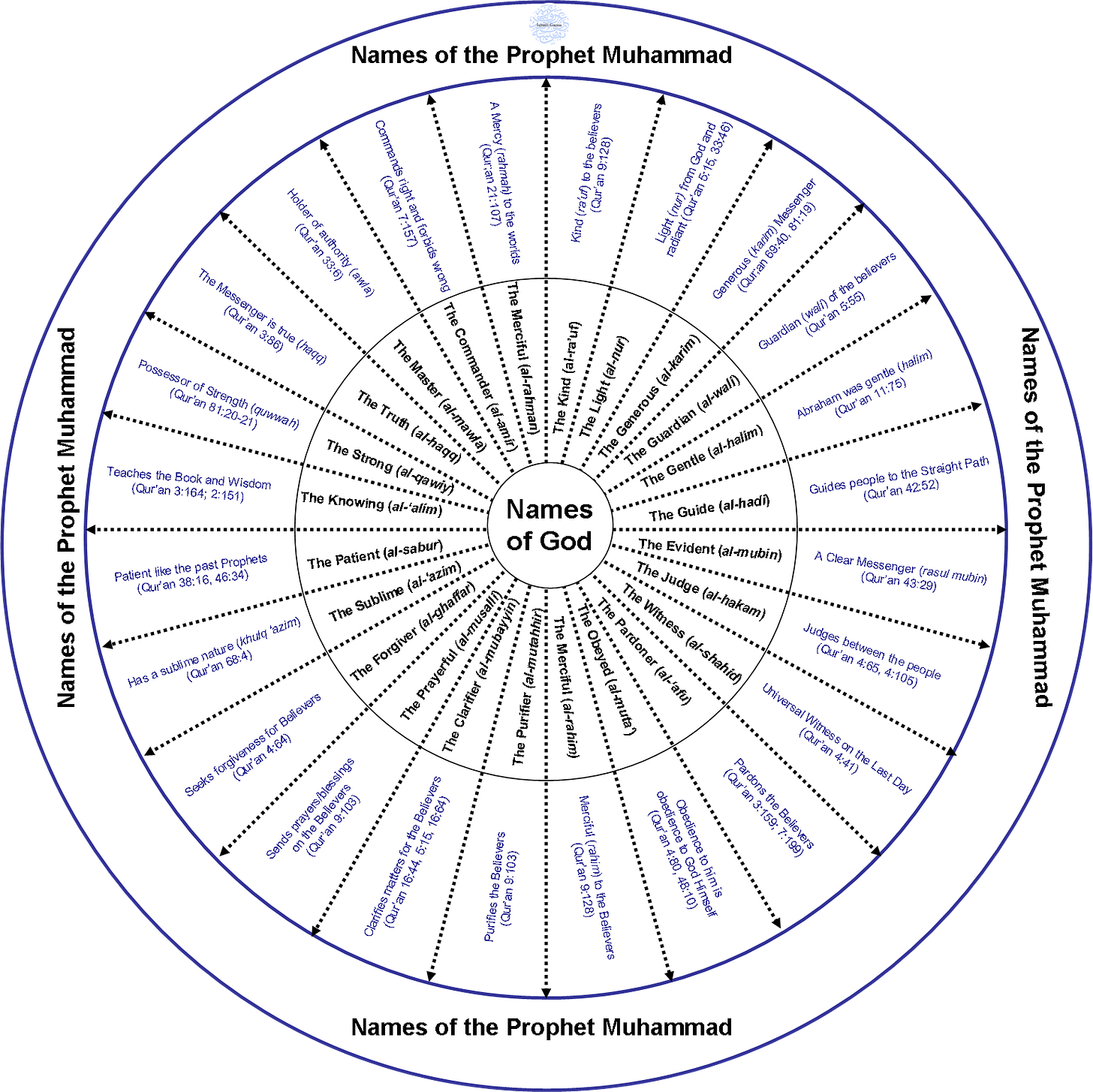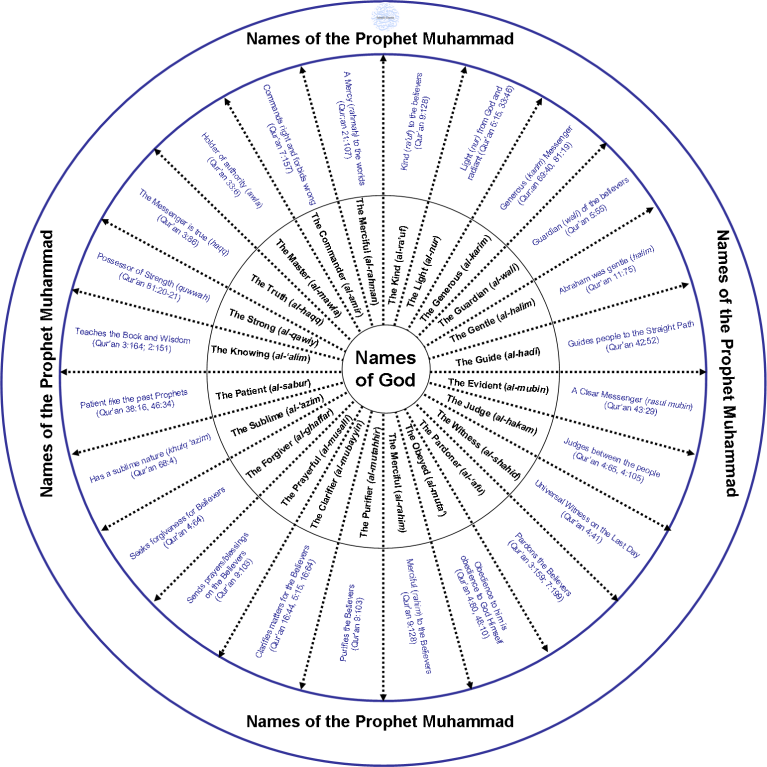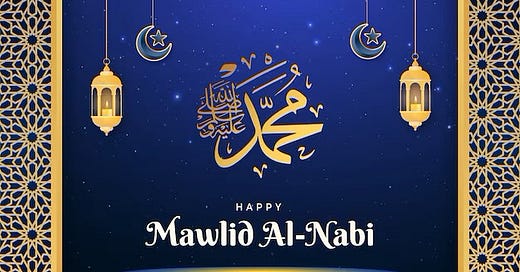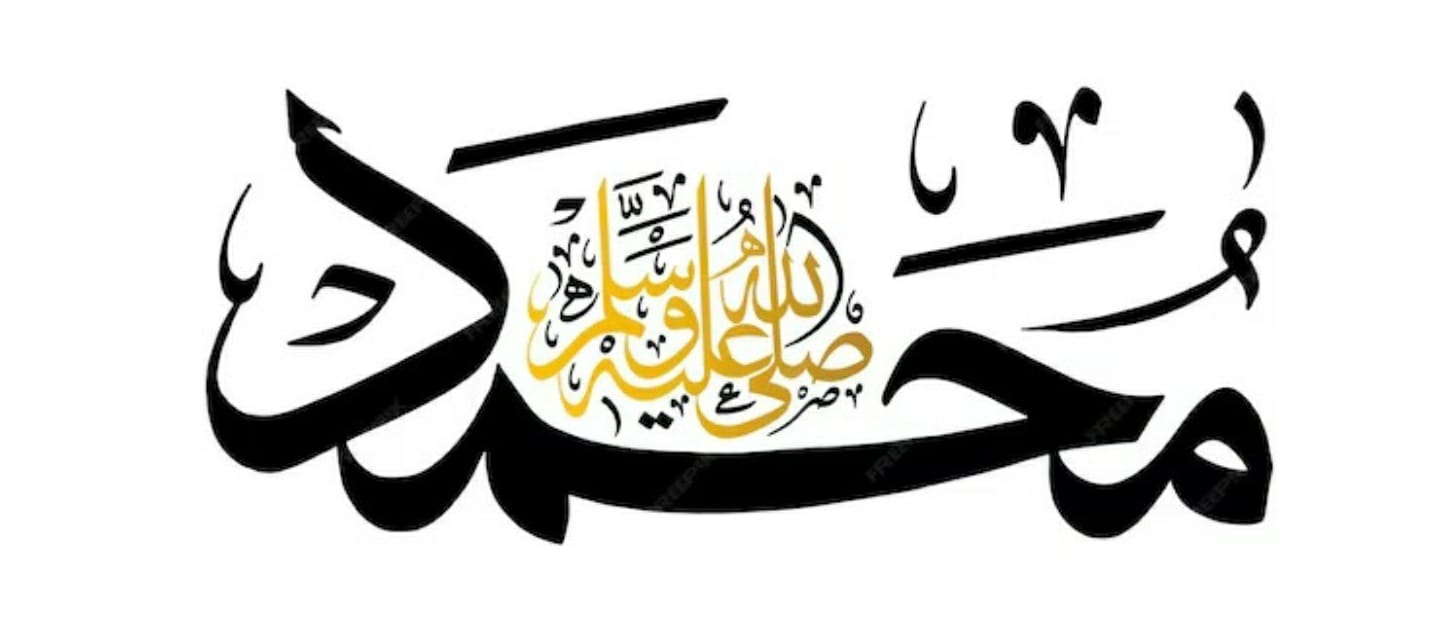The Prophet Unveiled: What the Qur’an says about the Prophet Muhammad (ﷺ)
Understanding the Metaphysical, Spiritual, and Religious Status of the Prophet (and His Successor, the Imam) in the Light of the Holy Qur’ān
Contemporary discussions about the Prophet Muḥammad’s (ﷺ) spiritual function, influenced by exoteric and literalist interpretations (such as Wahhabism or the Ahl al-Qur’ān school), have degenerated into a farce in which the Prophet is reduced to a mere mouthpiece or transmitter of the Qur’ān and nothing more. This view reduces the august person of Prophet Muḥammad (ﷺ) to a ‘fax-machine’ and fails to appreciate the spiritual depth of his status as Rasūl Allāh (Messenger of God). This important article, published on the occasion of Milād al-Nabī (the birthday of Prophet Muḥammad (ﷺ), first commemorated by his spiritual heirs and progeny, the Fatimid Imām-Caliphs), seeks to unveil the metaphysical, spiritual, and religious status of the Prophet Muḥammad (ﷺ) through a straightforward analysis of the verses of the Holy Qur’ān. The article is divided into two sections: the Prophet-Believer Relationship and the God-Prophet Relationship. It demonstrates that Prophet Muḥammad (ﷺ), as the “Messenger” (rasūl) of God, reveals not only the Qur’ān but also God’s very “Personality”—His Names, Attributes and Qualities—to the Believers. This article assumes that Muḥammad (ﷺ) is a true Prophet and that the Qur’an is divinely revealed; for logical and historical evidence supporting Muhammad’s (ﷺ) prophethood, see our article “Proof of Prophecy.”
For Muslims, the findings of this article raise certain imperatives in belief and practice, since the Qur’ān is God’s revelation and its verses present a most exalted image of the Prophet Muḥammad (ﷺ) whose presence must form the center of Muslim spiritual life. For academics and historians, this study reveals how the Qur’ān—the earliest piece of documentary evidence on the life of the Prophet— depicts Muḥammad’s (ﷺ) understanding of his spiritual status before God and his authority in relation to his followers. In both cases, it is clear that the original impulse of the faith that became known as Islam revolved around the person of the Prophet Muḥammad (ﷺ), not scripture, ḥadīth, law or scholars (‘ulamā’).
Today’s Shī‘ī Ismā‘īlī Muslims are often unfairly criticized for the respect, reverence, and love they show towards their present Imām—Mawlānā Shāh Karīm al-Ḥusaynī⁽ᶜ⁾Āgā Khān—based on the dubious and superficial notion that nothing should be accorded reverence except God. However, if the Imām is the spiritual, religious and blood successor of the Prophet, then the Imāms would logically continue to perform all the prophetic functions except the revelation of the Qur’ān. Accordingly if one accepts the principle of the Shī‘ī Imāmah, all the reverence due to the Prophet would be directed to the Imāms, who are his spiritual heirs. Thus, it should come as no surprise that the numerous spiritual responsibilities vested in Prophet Muḥammad (ﷺ) by the Qur’ān continue to be performed today by Imām Shāh Karim⁽ᶜ⁾ Āgā Khān IV, including the functions of guidance, guardianship, mercy, forgiveness, pardon, intercession, blessings, and purification. All of these various functions are attested to by Qur’anic verses quoted in this post.
The diagram below summarizes the two main topics of this post: the Prophet-Believer relationship and the God-Prophet relationship. The inner circle list the Names of God while the outer circle lists each prophetic function in relation to the Believers, through which Prophet Muḥammad (ﷺ) manifests one of the Names of God in his very person:

We encourage readers to scan through this post to gain a better understanding of the arguments and to note the key Qur’ānic verses concerning the spiritual status and authority of Prophet Muḥammad (ﷺ).
Part 1: The Prophet-Believer Relationship
The Comprehensive Mission of the Prophet Muhammad (ﷺ)
“Even as We have sent among you a Messenger from you, reciting to you Our Signs, and purifying you (yuzakkīkum), and teaching you (yu‘allimukum) the Book (al-kitāb) and Wisdom (al-ḥikmah), and teaching you that which you do not know.”
Holy Qur’ān 2:151 (see also 62:2, 3:164)
The above verse shows that the mission of Muḥammad (ﷺ) involves much more than just revealing the Qur’ān. In fact, only Muḥammad’s (ﷺ) first duty—“reciting to you our Signs (ayāt)”—refers to the Qur’ān. The Prophet’s other duties include purification (tazkiyyah), teaching (ta‘līm) of the Book, imparting the inner Wisdom of the Book, and teaching new knowledge to the Believers. Thus, the revelation of the Qur’ān constitutes only one part of the Prophet’s overall mission.
The Prophet Muhammad (ﷺ) is the Guide of the Believers
“And verily you [Muḥammad] surely guide to the Straight Path (ṣiraṭ al-mustaqīm).”
All Muslims pray for God to guide them to the Straight Path in every prayer. However, the verse above, revealed to the Prophet, clearly shows that it is actually Muḥammad’s (ﷺ) duty to “guide to the Straight Path”.
“And We have sent down unto you (also) the Reminder; that you may explain clearly (li-tubayyina) to mankind what was sent down for them, and that they reflect.”
Holy Qur’ān 16:44 (see also 16:64, 14:4)
The verse above demonstrates how the Prophet—in addition to revealing the Qur’ān—must also provide the “explanation” (bayān) of the Qur’ān to the believers encouraging their own reflections (fikr).
The Prophet Muhammad’s (ﷺ) Authority over the Believers is unlimited
To obey Prophet Muḥammad (ﷺ) is to obey God Himself
“He who obeys the Messenger, obeys God.”
“We sent a Messenger only to be obeyed by the permission of God.”
“Verily, those who give their bay‘ah to you, they surely give their bay‘ah to God Himself.”
The verses above show that obedience to the Prophet is equal to and tantamount to obedience to God. It logically follows that all commands in the Qur’ān to “obey God” are fulfilled only by obeying Prophet Muḥammad (ﷺ).
“So whatever the Messenger gives you, take it. And whatever he forbids you, abstain from it.”
The verse above indicates that it is indeed Prophet Muḥammad (ﷺ) who determines what is allowed and what is forbidden. Whatever the Prophet gives to the Believers—whether guidance, prescribed rituals, or rules of behavior—must be followed.
Prophet Muḥammad (ﷺ) has more authority and closeness to the Believers than their own souls:
“The Prophet has more authority (awla) over the believers than their own souls.”
Prophet Muḥammad (ﷺ) is the Lord-Guardian of the Believers:
“Verily, your Lord-Guardian (walī) is only God, His Messenger, and those who have faith, who establish regular prayers, and give the zakah while they bow down.”
The Prophet Muhammad (ﷺ) is the final judge and arbiter in all matters
“But no, by the Lord, they do not have faith, until they make you [Muḥammad] judge in all disputes between them, and find in their souls no resistance against your decrees, but they submit (to you) in full submission.:
“Verily, We have sent down to you the Book with the Truth so that you judge between the people by what God as shown you.”
“The answer of the Believers, when summoned to God and His Messenger, in order that he may judge between them, is no other than this: they say, ‘We hear and we obey’: it is such as these that will attain felicity.”
“It is not fitting for a Believer, man or woman, when a matter has been decided by God and His Messenger to have any option about their decision: if any one disobeys God and His Messenger, he is indeed on a clearly wrong Path.”
All of the verses above describe the proper relationship of the Believer to the Prophet. Indeed, the very condition of having “faith” (īmān) is to wholeheartedly accept and submit to the Prophet’s judgment, decrees, and orders without question.
The Prophet Muhammad (ﷺ) deserves absolute respect, reverence and honour
The believers are to honour and respect Prophet Muḥammad (ﷺ):
“In order that you have faith in God and His Messenger, that you may assist him and honour him, and praise Him morning and evening.”
“Those who follow the Messenger, the ummī Prophet, whom they will find described in the Torah and the Gospel (which are) with them. He will enjoin on them that which is right and forbid them that which is wrong. He will make lawful for them all good things and prohibit for them only the foul; and he will relieve them of their burden and the fetters that they used to wear. Then those who have faith in him, and honour him, and help him, and follow the light which is sent down with him: they are the successful.”
The Believers must be humble and lower their voices in the presence of Prophet Muḥammad (ﷺ):
“O you who have faith! Do not be forward in the presence of God and His Messenger; but fear God: for God is He Who hears and knows all things. O you who believe! Raise not your voices above the voice of the Prophet, nor speak aloud to him in talk, as you may speak aloud to one another, lest your deeds become vain and you perceive not. Those that lower their voices in the presence of God’s Messenger,- their hearts has Allah tested for piety: for them is Forgiveness and a great Reward.”
The Prophet Muhammad (ﷺ) embodies Divine Mercy and Forgiveness
God loves and forgives the believers on the condition that they obey Prophet Muḥammad (ﷺ):
“Say (O Muḥammad): ‘If you do love God, Follow me: God will love you and forgive you your sins: For God is Oft-Forgiving, Most Merciful’.”
God’s love and forgiveness reach the Believers only through their obedience to Prophet Muḥammad (ﷺ). This shows that the Prophet serves as the “gate” and “channel” of God’s love and forgiveness.
Obedience to Prophet Muhammad ﷺ brings the Mercy of God to the Believers:
“And obey God and the Messenger; that you may obtain mercy.”
Prophet Muhammad himself (ﷺ) is God’s mercy to all worlds:
“And we have only sent you [Muḥammad] as a Mercy to the worlds.”
Prophet Muḥammad (ﷺ) is gentle as a result of God’s Mercy:
“It is by the Mercy from God that you [O Muḥammad] were gentle with them, for if you had been stern of heart they would have dispersed from around you.”
This verse establishes that the Prophet Muḥammad’s (ﷺ) gentle qualities toward the Believers are expressions of God’s mercy. This suggests that the Prophet’s own mercy is, in fact, a manifestation of God’s mercy.
Prophet Muḥammad (ﷺ) is kind and merciful to the Believers:
“There has certainly come to you a Messenger from among yourselves. Grievous to him is what you suffer; [he is] concerned over you and to the believers is kind (ra’ūf) and merciful (raḥīm).”
The presence of Prophet Muḥammad (ﷺ) wards off God’s punishment:
“But Allah would not punish them while you, [O Muhammad], are among them, and God would not punish them while they seek forgiveness.”
Prophet Muḥammad (ﷺ) seeks God’s forgiveness on behalf of the Believers:
“And if, when they wronged their souls, they had come to you, [O Muḥammad], and asked forgiveness of God and the Messenger had asked forgiveness for them, they would have found God Forgiving and Merciful.”
The verse above shows that a) when the Believers seek God’s forgiveness, they must go into the physical presence of the Prophet; b) the Prophet must pray to God and seek forgiveness for the Believers; and c) only after the Prophet’s prayer for forgiveness will the Believers have “found God Forgiving and Merciful”. This demonstrates that Prophet Muḥammad (ﷺ) acts as the intercessor and mediator between God and the Believers with respect to God’s forgiveness and mercy.
Some people are too arrogant to accept Prophet Muḥammad’s (ﷺ) prayers for God’s forgiveness:
“And when it is said to them, “Come, the Messenger of Allah will ask forgiveness for you,” they turn their heads aside and you see them evading while they are arrogant.”
Despite the Qur’ānic promise regarding Prophet Muḥammad’s (ﷺ) prayers, some people—even some Muslims today—may be too arrogant to accept the reality and necessity of the Prophet’s special intercessory prayers.
Prophet Muḥammad (ﷺ) himself pardons and forgives the Believers for their sins and errors:
“It is by the Mercy from God that you [O Muḥammad] were gentle with them, for if you had been stern of heart they would have dispersed from around you. So pardon (‘afu ‘anhum) them and ask forgiveness (astaghfir lahum) for them and consult with them upon the conduct of affairs. And when you are resolved, then put your trust in God. Lo! God loveth those who put their trust (in Him).”
“Hold to forgiveness (al-‘afū); command what is right; But turn away from the ignorant.”
The above verses confirm that Prophet Muḥammad (ﷺ) has been commanded to pray to God on behalf of the Believers who seek God’s forgiveness. Additionally, these verses also instruct the Prophet to perform another act of forgiveness or ‘pardoning’ (indicated by the Arabic word ‘afwa, which is related to the Urdu word ma‘af). Thus, the Prophet Muḥammad (ﷺ) both a) seeks God’s forgiveness for the Believers as an intercessor and b) pardons the Believers through his own act of forgiveness (see also 5:13). Both forms of prophetic forgiveness are necessary.
The Prophet Muhammad (ﷺ) receives devotional offerings (sadaqah) from the Believers and thereby purifies, sanctifies, and blesses them with his special prayers
The Believers must submit an offering to Prophet Muḥammad (ﷺ) before having a private meeting with him:
“O you who have faith! When you privately consult the Messenger, then present an offering (ṣadaqah) before your private consultation. That will be best for you, and purer for you. But if you find not (the means), God is Oft-Forgiving, Most Merciful.”
This verse establishes that Believers should seek to have private meetings (najwā) with the Prophet. The Qur’ān recommends that each Believer submit an offering (ṣadaqah) to the Prophet before these special meetings, and that this offering serves as a means of purity (tahārah) for the Believers.
The Believer’s submission of their wealth to Prophet Muḥammad (ﷺ) is the means to obtain the Prophet’s special blessings and prayers:
“And among the Arabs are those who have faith in God and the Last Day and take what they spend as a means of closeness toward God and the prayers/blessings (ṣalawāt) of the Messenger. Behold, it is indeed a means of closeness for them. God will make them enter in His Mercy. Indeed, God is Most Forgiving, Most Merciful.”
The above verse is significant because it confirms that some Arabs would give a portion of their wealth to the Prophet as a means of attaining his prayers or blessings (ṣalawāt) and drawing closer to God. The verse encourages this practice of submitting offerings and states that, as a result, such people will be granted entry into God’s Mercy.
“And (there are) others who have acknowledged their faults. They mixed a righteous action with another that was bad. It may be that Allah will relent toward them. Lo! Allah is Forgiving, Merciful. Take offerings (ṣadaqah) from their wealth, and purify and sanctify them by means of it. And pray/send blessings over them. Verily, your prayer/blessing is a source of peace (sakan) for them. And God is the Hearing, the Knowing.”
Having established in 9:99 that sincere offerings to the Prophet are a means to obtain his ṣalawāt and proximity to the Divine, as shown above, the verses that follow describe Believers who have performed good deeds but have also committed sins while acknowledging their faults. The Qur’ān instructs such individuals—who have committed wrong-doing—to give an offering (ṣadaqah) from their wealth (amwāl) to the Prophet. The Prophet is then commanded to accept these offerings (ṣadaqah) and thereby purify and sanctify the Believers. Muḥammad (ﷺ) is further directed by God to bestow his special prayers or blessings upon the Believers, with the assurance that his prayers will serve as a source of peace (sakan) for them. These verses clearly indicate that it was the prophetic practice of Muḥammad (ﷺ) to accept material offerings from the Believers, purify and sanctify them, and pray for them.
In fact, the original concept of zakah was not simply charity or alms. Zakah and ṣadaqah were offerings that the believers made to Prophet Muḥammad (ﷺ) to seek forgiveness for their sins and attain spiritual purification through his prayers and blessings—as demonstrated in the verses mentioned above verses. On this matter, the renowned scholar of early Islam, Fred Donner has written:
Later Muslim tradition refers to such charity under the terms zakat or sadaqa, usually rendered “almsgiving”; these two terms are closely associated with prayer in numerous Qur’anic passages, and later Muslim tradition considers them, like prayer, to be one of the “pillars of the faith” that define a Believer. Recent research suggests, however, that the original Qur’anic meaning of zakat and sadaqa was not almsgiving, but rather a fine or payment made by someone who was guilty of some kind of sin, in exchange for which Muhammad would pray in order that they might be purified of their sin and that their other affairs might prosper. Indeed, even in the verse just cited (2:177), one notes that payment of zakat is mentioned after prayer, suggesting that it was something different than the giving of wealth to the poor (what we usually mean by almsgiving), which is treated in the verse before mention of prayer. This understanding of zakat or sadaqa as a payment for atonement or purification of sins is clearest in the following verses: “Others have confessed their sins … Take from their property sadaqa to cleanse them, and purify [tuzakki] them thereby, and pray for them, indeed your prayer is a consolation to them. God is all-hearing, all-knowing” (Q. 9:102-103); the verb “to purify” is from the same Arabic root as zakat. The fact that Believers were sometimes required to make such purification payments, however, underscores how the community was, in principle, focused on maintaining its inner purity, on being as much as possible a community that lived strictly in righteousness, so as to set themselves apart from the sinful world around them and thus to attain salvation in the afterlife.
Fred Donner, Muhammad and the Believers: At the Origins of Islam (Cambridge, MA: Harvard University Press, 2010), 64.
The Prophet Muhammad (ﷺ) is a Light from God that clarifies all things
“O People of the Book! Now has Our Messenger come unto you, clarifying for you much of what you used to hide of the Book, and forgiving much. Now there has come unto you a Light (nūr) from God and a manifest Book.”
Holy Qur’ān 5:15 (see also 5:19, 16:44, 16:64)
“O Prophet! Lo! We have sent you as a witness and a bringer of good tidings and a warner and a summoner unto God by His permission and as a lamp that gives light (sirāj munīran).”
“Those who disbelieve among the People of the Book and among the Polytheists, were not going to depart (from their ways) until there should come to them the Clear Proof (al-bayyinah) – a Messenger from God reciting purified pages.”
The Prophet Muhammad’s (ﷺ) inner character is Sublime
“You [Muḥammad] are not, by the Favour of your Lord, possessed (majnūn). Verily, for you is an unfailing reward. And you are surely upon exalted character (khulq ‘aẓīm).”
This verse describes the Prophet’s character or inner constitution (khulq) as “sublime” (‘aẓīm). This is significant because the Qur’ān also refers to itself as “sublime” (‘aẓīm) and often mentions God as “the Sublime One” (al-‘aẓīm).
The Prophet Muhammad (ﷺ) is the Universal Witness of God over Humankind
“So how [will it be] when We bring from every people (ummah) a witness (shahīd) and We bring you [O Muḥammad] against these [people] as a witness?”
This verse is among the most mysterious in the entire Qur’ān. It indicates that on the Day of Judgment, the Prophet Muḥammad (ﷺ) will serve as a witness over all the witnesses of every nation or people. The Prophet’s role as universal witness suggests that he must remain spiritually present in the world at all times in order to bear witness to the deeds of all human beings.
The Prophet Muhammad (ﷺ) receives grace, mercy, and knowledge from God
“And if it was not for the Grace of God upon you [O Muḥammad], and His Mercy, a group of them would have determined to mislead you. But they do not mislead except themselves, and they will not harm you at all. And God has revealed to you the Book and Wisdom and has taught you that which you did not know. And ever has the Grace of God upon you been great.”
The Prophet Muhammad (ﷺ) is inspired by God through the Holy Spirit and Light
“Your companion/master (ṣāḥib) is not astray or deceived. He does not speak out of caprice/desire (al-hawā). It is no less than inspired inspiration (waḥyun yūḥa).”
“The Trustworthy Spirit (rūḥ al-amīn) descended with it [the revelation] upon your heart (qalbika) so that you would be among the warners in clear Arabic language.”
“And that We have inspired you [Muḥammad] with a Spirit (rūḥ) from Our Command. You did not know what was the Book (kitāb) and what was the Faith. But We have made it a Light (nūr) by which We guide those of our Servants as We will. And verily, you guide to a Straight Path.”
These verses illustrate the nature of the divine inspiration (wahy; ta’yīd) that God granted Prophet Muḥammad (ﷺ). First, this inspiration is spiritual in nature and flows through the Holy Spirit, which comes from God’s Command (amr). Second, the inspiration comes upon the Prophet through his heart—the spiritual faculty of the human soul—and not in the form of sounds, words, or letters. Thus, divine inspiration is not a form of verbal dictation; such an idea would undermine the spiritual depth of the Prophet. Third, the verses show that whatever Muḥammad (ﷺ) says, does, or thinks is divinely-inspired—not only the revealed Qur’ān—but all of the Prophet’s speech and guidance are guided by God, not by human whims or desires. This prophetic inspiration is continuous, not discrete; it does not cease and resume but flows like a stream. Finally, it is this inspiration or divine assistance granted to Prophet Muḥammad (ﷺ) that enables him to perform and fulfill his prophetic functions. The very soul of the Prophet is continuously supported, inspired and guided by the Holy Spirit—this is what elevates him spiritually beyond an ordinary human being. From this, we might even conclude that both the Qur’ān and the Prophet’s personality are manifestations of the same Holy Spirit that flows from the Command of God.
Below is a summary of the above Qur’ānic verses about the Prophet:
The Status of the Prophet Muhammad (ﷺ) in the Qur’ān
The Prophet is
inspired by the Holy Spirit (42:52, 26:192-194)
a mercy (raḥmah) to the worlds (21:107)
merciful (raḥīm) to the Believers (9:128)
kind (ra’ūf) to the Believers (9:128)
an honourable Messenger (rasūl karīm) (69:40; 81:19-21)
a light (nūr) from God (5:15) and a radiant lamp (sirāj munīr) (33:46)
(like Prophet Abraham⁽ᶜ⁾) gentle (ḥalīm) to the Believers (11:75)
the possessor of power (dhū al-quwwah) (81:20-21)
the teacher (mu‘allim) of the Book and Wisdom and new knowledge (62:2; 3:164; 2:151)
like his predecessors: patient (ṣabūr) (38:16, 46:34)
the witness (shahīd) of humankind on the Day of Judgment (2:143, 33:46; 4:41)
the guardian (walī) of the Believers (5:55)
one who prays to God for the Believer’s forgiveness (4:64, 63:5, 3:159, 60:12, 24:62)
one who forgives the Believers (5:13; 3:159; 7:199)
one who guides the Believers to the Straight Path (45:25)
one whose nature or character is sublime (‘aẓīm) (68:4)
judge of the believers (4:65; 4:105; 24:51; 33:36)
one who makes things clear to the Believers (5:15; 5:19; 16:44; 16:64; 14:4)
one who purifies and sanctifies the believers (9:103)
one who holds authority (awlā) over the Believers (33:6)
one who summons the Believers to that which gives them life (8:24).
one who recites the Signs of God (2:151)
one who sends ṣalawāt (blessings, prayers) upon the Believers (9:103)
one who receives offerings (ṣadaqa) from the Believers (9:103; 58:12)
one who brings the people from darkness to Light (14:1; 14:5 65:11)
a beautiful pattern for the Believers (33:21)
the object of great respect and veneration (48:9, 49:1-3)
one who commands the lawful and forbids the wrong (7:157)
one about whom God says: “those who who give their allegiance (bay‘ah) to you have indeed given it to God” (48:10)
one about whom God says: “whoever obeys the Messenger, indeed obeys God” (4:80; 4:64)
Part 2: The God-Prophet Relationship
When one examines the above verses in greater detail, it becomes apparent that a number of the qualities, attributes, and functions that the Qur’ān assigns to Prophet Muḥammad (ﷺ) are rooted in or identical to the Most Beautiful Names of God.
For example, we are told that Muḥammad’s (ﷺ) duty is not to guide the believers—rather, it is God who guides whom He wills:
“Their guidance is not your responsibility [O Muḥammad], but God guides whom He wills.”
However, another verse—quoted earlier—states that Muḥammad (ﷺ) guides the people to the Straight Path:
“And that We have inspired you [Muḥammad] with a Spirit from Our Command. You did not know what was the Book (kitāb) and what was the Faith. But We have made it a Light (nūr) by which We guide those of our Servants as We will. And verily, you guide to a Straight Path.”
When both verses are considered in context, the conclusion is that Muḥammad (ﷺ) is guided by God directly through the Holy Spirit, and in turn, he guides the Believers on God’s behalf. Therefore, God effectively guides people through the guidance of Muḥammad (ﷺ). Accordingly, the Prophet’s guidance is a manifestation of God’s guidance the Prophet’s role as “the guide” (al-ḥādī) to the Straight Path is a reflection on earth of God’s Name al-Ḥādī.
A second example of the Prophet’s mediation in manifesting God’s acts is seen in the acceptance of the ṣadaqah (offerings) and repentance of the Believers:
“And (there are) others who have acknowledged their faults. They mixed a righteous action with another that was bad. It may be that Allah will relent toward them. Lo! Allah is Forgiving, Merciful. [O Muḥammad] Take (khud) offerings (ṣadaqah) from their wealth (amwālihum), and purify and sanctify them by means of it. And pray/send blessings over them. Verily, your prayer/blessing is a source of peace (sakan) for them. And God is the Hearing, the Knowing. Do they not know that it is God who accepts repentance from His servants and takes the offerings (ya’khudu al-ṣadaqāt) and that it is God who is the Accepting of repentance, the Merciful?”
In Qur’an 9:103, the Prophet is commanded to “Take (khud) offerings (ṣadaqah) from their wealth (amwālihum)”. Yet verse 9:104 confirms that it is God who “takes the offerings (ya’khudu al-ṣadaqāt)”. Similarly, the Prophet is instructed to purify (tuṭahhiruhum) and sanctify (tuzakkiruhum) them by means of this offering. However, the Qur’ān also says that “God purifies (yuzakkī) whom He wills” (Qur’ān 24:21; see also 33:33). Once again, the only logical conclusion from such verses is that God purifies whom He wills through Prophet Muḥammad’s (ﷺ) act of purifying the Believers. Thus, Muḥammad (ﷺ) serves as the intercessor, the means of approach (wasīlah) and mediator (wasīṭah) between God and the Believers.
A third example is found in verses that describe the nature of Prophet Muḥammad (ﷺ) with attributes that are essentially the same as those of God Himself. In numerous Qur’ānic verses (e.g., 9:117), God is referred to as “the Kind, the Merciful” (al-ra’ūf al-raḥīm). However, the verse below gives the exact same description of the Prophet:
“There has certainly come to you a Messenger from among yourselves. Grievous to him is what you suffer; [he is] concerned over you and to the believers is kind (ra’ūf) and merciful (raḥīm).”
In this verse, Muḥammad (ﷺ) is described—in the exact same terms as the Names of God—as “kind and merciful” (ra’ūf raḥīm). Similarly, the Qur’ān describes the inner nature of the Prophet as ‘aẓīm (sublime), which is also one of the Names of God. In this regard, Imām Ja‘far al-Ṣādiq⁽ᶜ⁾ has stated that God has indeed adorned Prophet Muḥammad (ﷺ) with His own Attributes:
“Between Himself and them [his creatures], He placed one of their own species, clothing him in His own attributes of compassion and mercy.”
Imam Ja‘far al-Ṣādiq, quoted in Reza Shah-Kazemi, Spiritual Quest: Reflections on Qur’ānic Prayer According to the Teachings of Imam ‘Alī (London: I.B. Tauris in association with the Institute of Ismaili Studies, 2011), 25.
Perhaps the most enigmatic and mysterious Qur’ānic verse expressing the relationship between Prophet Muḥammad (ﷺ) and God is as follows. This verse was revealed in the context of an occasion where the Prophet had to throw some stones to defend himself:
“And you [Muḥammad] did not throw when you threw, but it was God who threw in order that He may test the Believers with a beautiful trial.”
On one hand, Muḥammad’s (ﷺ) act of throwing the stones himself is affirmed (“when you threw”), and on the other hand, the Prophet’s act is negated (“you did not throw”) and attributed to God (“but it was God who threw”). Thus, it is God who “threw” the stones through Muḥammad’s (ﷺ) act of throwing. This verse illustrates how God acts through the actions of His Prophet. Similarly, in Qur’ān 48:10—referring to the Believer’s placing their hands under the Prophet’s hands in the act of bay‘ah—the Qur’ān states that “the Hand of God is upon their hands.” This is significant because, physically, it was Muḥammad’s (ﷺ) hand that was placed upon the hands of the Believers. However, the Qur’ān attributes the act to God.
Thus, the Prophet Muḥammad (ﷺ) serves as the instrument or intermediary through which God acts toward the Believers and, in his own person, embodies the highest reflection or manifestation of God’s Names and Attributes. This may seem contradictory at first, since the Prophet Muḥammad (ﷺ) is undoubtedly a creature and servant (‘abd) of God. However, true and complete servitude (‘ibadah) before God involves the effacement of all individual egotism and impurity. A soul that is entirely effaced and humble before its Lord is like a shiny and polished mirror in which God’s Attributes shine and are reflected. In this respect, the Prophet is both the humblest servant of God and the highest locus of manifestation (maẓhar) or reflector of God’s Names and Attributes. This also makes Muḥammad (ﷺ) the best of all created beings and the preeminent intercessor and mediator between God and His creatures.
The Qur’ānic verses that demonstrate how the Prophet is both the intercessor between God and the Believers and the locus of manifestation (maẓhar) of God’s Names and Attributes are as follows:
The Relationship between God’s Attributes and the Prophet Muhammad (ﷺ)
God is al-Raḥmān (The Merciful) and the Prophet is raḥmah (mercy) (21:107)
God is al-Raḥīm (The Beneficent) and the Prophet is raḥīm (9:128)
God is al-Ra’ūf (The Kind) and the Prophet is ra’uf (9:128)
God is al-Karīm (The Generous) and the Prophet is karīm (69:40; 81:19-21)
God is al-Nūr (The Light) and the Prophet is nūr from God (5:15) and a radiant lamp (sirāj munīr) (33:46)
God is al-Ḥalīm (The Forbearing) and the Prophet is halīm (11:75)
God is al-Qawiy (The Strong) and the Prophet is dhū al-quwwah (81:20-21)
God is al-‘Ālim (the Knower) and the Prophet is the teacher (mu‘allim) of the Book and Wisdom and new knowledge (62:2; 3:164; 2:151)
God is al-Ṣabūr (The Patient) and the Prophets are ṣabūr (38:16, 46:34)
God is al-Shahīd (The Witness) and the Prophet is shahīd (witness) of humankind (2:143, 33:46; 4:41)
God is al-Walī (The Guardian) and the Prophet is the walī of the Believers (5:55)
God is al-Ghaffar (The Forgiver) and the Prophet is the means for the believers to receive forgiveness (4:64, 63:5, 3:159, 60:12)
God is al-‘Afū (The Pardoner) and the Prophet pardons the Believers (5:13; 3:159; 7:199)
God is al-Hādī (The Guide) and the Prophet guides to the Straight Path (45:25)
God is al-‘Aẓīm (The Great) and the Prophet’s nature is ‘aẓīm (68:4)
God is al-Ḥakam (The Judge) and the Prophet Muḥammad is the judge of the Believers (4:65; 4:105; 24:51; 33:36)
God is al-Mubayyin (The Clarifier) (5:75, 24:58) and the Prophet makes things clear (5:15; 5:19; 16:44; 16:64; 14:4)
God is al-Mutahhir (The Purifier) (4:49; 33:33) and the Prophet purifies the believers (9:103)
God is al-Mawlā (The Master) and the Prophet holds awlā (authority) over the Believers (33:6)
God is al-Muḥyī (The Giver of Life) and the Prophet summons the Believers to that which gives them life (8:24).
God recites His Signs (2:252; 3:108) and the Prophet recites His Signs (2:151).
God sends Ṣalawāt (blessings) and the Prophet sends ṣalawāt (9:103)
God receives ṣadaqah (9:104) when the Prophet receives ṣadaqah (9:103; 58:12)
God brings the people from darkness to Light (2:257) and the Prophet brings the people from darkness to Light (14:1; 14:5 65:11)
Whoever gives their allegiance (bay‘ah) to the Prophet has given it to God (48:10)
God commands the right and forbids the wrong (66:6) and the Prophet commands the lawful and forbids the wrong (7:157)
He who obeys the Prophet, obeys God (4:80; 4:64)
When the Prophet threw stones, it was actually God who threw (8:17)
The diagram below summarizes the two topics of this post: the Prophet-Believer relationship and the God-Prophet relationship. The inner circle lists the Names of God while the outer circle outlines each prophetic function in relation to the Believers, showing how Prophet Muḥammad (ﷺ) manifests one of the Names of God in his very person:

Conclusion: The Need for Prophet Muhammad’s (ﷺ) Successor
To summarize once again, the Qur’ān attributes the following descriptions, qualities, and functions to Prophet Muḥammad (ﷺ):
The Prophet is inspired by the Holy Spirit (42:52, 26:192-194)
The Prophet is the mercy (raḥmah) to the worlds (21:107)
The Prophet is merciful (raḥīm) to the Believers (9:128)
The Prophet is kind (ra’ūf) the Believers (9:128)
The Prophet is an honourable Messenger (rasūl karīm) (69:40; 81:19-21)
The Prophet is light (nūr) from God (5:15) and a radiant lamp (sirāj munīr) (33:46)
The Prophet (like Prophet Abraham⁽ᶜ⁾) is gentle (ḥalīm) to the Believers (11:75)
The Prophet is the possessor of power (dhū al-quwwah) (81:20-21)
The Prophet is the teacher (mu‘allim) of the Book and Wisdom and new knowledge (62:2; 3:164; 2:151)
The Prophet, like his predecessors, is patient (ṣabūr) (38:16, 46:34)
The Prophet is the witness (shahīd) of humankind on the Day of Judgment (2:143, 33:46; 4:41)
The Prophet is the guardian (walī) of the Believers (5:55)
The Prophet prays to God for the Believer’s forgiveness (4:64, 63:5, 3:159, 60:12, 24:62)
The Prophet forgives the Believers (5:13; 3:159; 7:199)
The Prophet guides the Believers to the Straight Path (45:25)
The Prophet’s nature or character is sublime (‘aẓīm) (68:4)
The Prophet is the judge of the believers (4:65; 4:105; 24:51; 33:36)
The Prophet makes things clear to the Believers (5:15; 5:19; 16:44; 16:64; 14:4)
The Prophet purifies and sanctifies the believers (9:103)
The Prophet holds authority (awlā) over the Believers (33:6)
The Prophet summons the Believers to that which gives them life (8:24).
The Prophet recites the Signs of God (2:151).
The Prophet sends ṣalawāt (blessings, prayers) upon the Believers (9:103)
The Prophet receives offerings (ṣadaqa) from the Believers (9:103; 58:12)
The Prophet brings the people from darkness to Light (14:1; 14:5 65:11)
The Prophet is a beautiful pattern for the Believers (33:21)
The Prophet is the object of great respect and veneration (48:9, 49:1-3)
The Prophet commands the lawful and forbids the wrong (7:157)
He who gives their allegiance (bay‘ah) to the Prophet has given it to God (48:10)
He who obeys the Prophet, obeys God (4:80; 4:64)
All of the above spiritual functions go far beyond Prophet Muḥammad’s (ﷺ) role of simply reciting and proclaiming the Qur’ān. In fact, these spiritual functions listed above fall under the category of walāyah (spiritual guardianship) and not that of legislative prophecy (nubuwwah)—which is only concerned solely with proclaiming the revelation. Focusing on a handful of these spiritual functions of Muḥammad (ﷺ) reveals the need for a spiritual heir and successor to the Prophet. If Muḥammad (ﷺ) was responsible for guiding the Believers on behalf of God, praying for their forgiveness (4:64), accepting offerings to purify them (9:102-104) on God’s behalf, sending blessings upon them for their tranquility (9:103), judging between them (4:65), and accepting their obedience on behalf of God—all during his lifetime—does this not necessitate the presence of someone to perform these critical spiritual functions for the Believers in every age and time after the Prophet’s departure? If the answer is negative, does this not contradict the very justice of God? Why would God bless the people of one particular time and age with someone to perform these functions, yet deprive countless human beings who live after him of the same blessing? The only logical conclusion is that a person like the Prophet must always be present in the world to continue the Prophet’s spiritual and religious mission.
The status of Muḥammad (ﷺ) as the Seal of the Prophets signifies only the conclusion of scriptural revelation and legislative prophecy. However, Divine inspiration (ta’yīd) and spiritual guardianship (walāyah) must always continue; otherwise, humanity would be wholly deprived of Divine guidance. Thus, the successor of the Prophet with respect to ta’yīd (divine inspiration) and the functions of walāyah—the selected individual who continues to guide the Believers on God’s behalf, pray for their forgiveness, accept their offerings and purify them on God’s behalf, send blessings upon them, judge between them, and accept their obedience on behalf of God—is the hereditary Ismā‘īlī Imām from the progeny or Ahl al-Bayt of Prophet Muḥammad (ﷺ).
There must also exist, by divine right, a continuation of at least a portion of the original link between man and God, much as it was when the prophet still lived. In other words, the world at all times must have a prophetically inspired person who, as the heir of the prophet himself, carries on the principle of his rule in all those matters where his authority was once supreme…. In the current historical era, this person is the Imām and he is of necessity a direct lineal descendant of Muḥammad through his single, chosen heir and executor, ‘Alī ibn Abī Ṭālib.
Paul E. Walker, Early Philosophical Shiism: The Ismaili Neoplatonism of Abū Ya‘qūb al-Sijistānī (Cambridge: Cambridge University Press, 1993), 3-4.
We hope the above exploration (or unveiling) of the Prophet’s roles and functions has been informative and helpful to readers and seekers of Ismaili Gnosis, particularly with respect to matters of walāyah. We pray that these insights—drawn from the Holy Qur’an—may lead to a deeper understanding of both nubuwwah and imamah in the unveiled light of God’s beloved Prophet(ﷺ). Āmīn, Ya Rabb al-‘Alamīn.
As always, please feel free to leave comments and share this post with interested friends and family.
Ya ‘Ali Madad,
Ismaili Gnosis
September 10th, 2024
Follow on Instagram
ismailignosis | blog.ismailignosis |














This article is very insightful and is of the greatest importance - especially when other Muslims of the Ummah ask any Ismaili about their Faith (Bayah) and their Holy imam - Shah Karim Al’Husanyi - of the Al Al’ Bayat - the true and direct descendant of the Prophet Muhamed (PBUH)
Wonderful work. 🙏